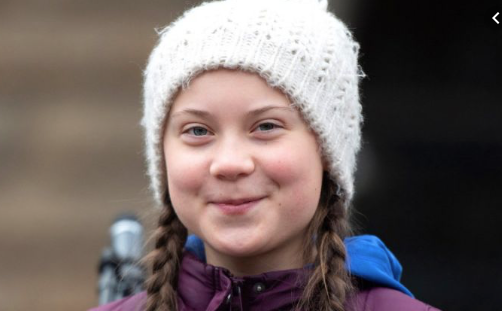Alternative Editorial: Dear Greta
Four Years Later: Metamorphosis Pinterest 139119075967004723
Dear Greta
I hope you weren’t too disappointed you didn’t win the Nobel Peace Prize, announced on Friday. My guess is that you managed it well.
I confess, I was deeply disappointed. The encouragement to Extinction Rebels on the streets who are risking their bodies and their freedom to get attention for the climate emergency, would have been enormous.
But my disappointment didn’t last long. I remembered when President Obama was awarded the Nobel Peace Prize so soon after being elected and how that eventually turned out. Although he made so many extraordinary advancements while in office, making peace was not his strength. In fact, drone warfare stepped up significantly on his watch, often with this explicit direction.
Did the Nobel Peace Prize give him some cover for his military agenda? Or create some complacency amongst his followers about his deeper values, particularly the use of hard power – guns and money - to create global stability? Maybe.
In your case, I can see now that winning the Peace Prize would have come too soon. Your call is not simply for recognition that something needs to be done, it’s a call to action. We need to see people fully in action before we can celebrate the effect of your call.
From all you say and do, often in deep frustration, I imagine you would agree with that. I see you celebrate the 7.5 million - mostly young - people on the streets two weeks ago. But that did nothing to soften your position when facing the UN. If anything it sharpened your pain. As you say, you – nor any of the kids who turn out every week - should not have to do this work. It is stealing your childhood.
Yet there still seems to be a huge gap between politicians agreeing with you, as many rush to do, and moving into the kind of action you know is required. What is that gap? I wonder if we could help work that out together? For example, you watched your own parents shift their actions from intending to act, to taking strong action – food, flying, consuming differently. Can their experience help others?
Greta Thunberg’s parents radically changed their lifestyles with their daughter
From our work in the political sphere, we see too much theory of action, not enough stepping into the reality and working from there. It’s like the difference between watching a game of tennis and being on the court, facing your opponent. The first is full of analysis – what the player should have done to win that point. The second is using every available skill and resource you have as the ball comes towards you. The first is a little detached; the second is totally immersed.
Which is why we advocate focusing our attention on the people in their local communities where the manure hits the fan. How does the emergency appear there and how, practically, can citizens begin to take action in ways that, at least, makes them feel stronger? At best, makes them capable of building a better future? When we look from this perspective, rather than from the top down, we notice quite a lot of different options for action. As if localism is already operating within a different system than the government is.
For example, working at ground level, you understand that the kind of actions that are better for our planet, are also better for communities. Growing and distributing local food brings people together, at the same time as saving on carbon, unnecessary plastics and excess production. Establishing local produce supermarkets is not as easy as it sounds, yet there are many developments occurring (see this from Budgens). In the meantime, local markets and independent stores are stepping up again – albeit with high prices due to small turnover. The feel-good that these initiatives generate also increases the demand.
The same local actions can extend to pulling together community energy sources, developing car-share clubs and improving local transport. To accessing cosmo-localsolutions for commoning practices, such as reclaiming land, public buildings or building digital networks. All this without – or in loose partnership with - local councils; who, though willing, are pretty restricted by party manifestos or government austerity policy.
Cosmos-localism: whole system appearing locally
Maybe most importantly, working at the community level helps people have the really difficult conversations that make engagement happen. Government policy reported by the media rarely lands with people as actual recommendations of action. Even Extinction Rebellion, while waking people up, leaves people somewhat dependent on government responses.
Your own shift into becoming vegan, stopping flying and buying new stuff seems to be too hard for older people (even in their 30s) to follow: is it because they are too programmed by consumerism? Are we addicted to the quick ways that products seem to answer our emotional needs?
That’s why we opened a Future Democracy Hub within XR, to offer tools and methods that bring people into more intimate conversations about why they can’t act.
· Empathy Circles that give people the chance to be heard properly, often for the first time in their lives.
· Death Cafes to help people face and transform their grief about what is happening. Knitting circles that give you something else to focus on while you’re building subtle bonds of trust.
· Talk Shops and Thinking Box that help the investigation of the thoughts and ideas on offer.
· Learning clubs that help people exchange the vital information we need, for free
· Collaboratories that offer friendly, cross-community, spaces for re-imagining our futures.
· Citizen Action Networks that offer containers for all these inquiries and new relationships to be in connection with the solutions already available.
This is all the deep work that needs to happen to help us move from thinking to action.
Yesterday, in the XR-occupied streets of London, I watched a crowd of people form a circle around four policemen using an electric chain saw to detach a teenager locked onto a monument. The crowd sang bravely as the teenager stared into space, maybe deep in meditation—but the spectacle was shocking. It was like watching a bomb disposal unit at work: one slip and we’d have a tragedy on our hands.
Not everyone can live at this level of painful reality. The mix on the XR streets seems to be a mixture of those with enough privilege to manage the insecurity, and those with nothing to lose. Many of the latter group are the very young – whose whole lives are threatened by this catastrophe. People like you, who can’t see the point of going to school when there is no future in which to have a career.
Others are the structurally poor, or those living in a gig economy, not knowing where the next bit of work is going to come from. Their grief is long term: the idea that something is very, very, wrong with our system is not new to them.
Only a few hundred yards from the chain saw, I could hear a steady commotion. Drums, cheers, whistles. Again, a happening on the street that many people moved away from rather than towards. As I got closer I could feel the rhythm better, I could see the movement was dancing rather than jostling.
Extinction Rebellion
The whistling was not to call people out, but to count them into the beginning and end of each burst of joyful cacophony. Energy surged through me and I could feel myself coming to life: literally ready for action.
Both spectacles, within close reach of each other, demanded deep levels of capacity on behalf of the participants and even the observers. It’s a spectacle of pain being channelled into life-affirming joy, on the streets in front of you. Beyond this site that same feeling was being carried by spectacular performances by the Red Rebels or daring actions such as the sight impaired, Paralympic Champion climbing on a plane.
Such shocking interventions may, collectively, be the reason that Extinction Rebellion has managed to break through our media channels and capture our attention. In the century old campaign for a sustainable planet, this is as much a front line as Maginotwas during the second World War.
What I’ve been describing, over this letter, are three interdependent theatres of action:
· Firstly, your call which is bringing millions onto the street and getting the attention of governments all over the world.
· Secondly, Extinction Rebellion which is disrupting business as usual and channelling the pain of grief and waking up into the public space.
· And thirdly all the work now being done at the cosmo-local level to help people move from inaction to action, despite the governments’ inability to wake up. Local and global networks of networks that signify a change in the system, capable of turning this around.
With all that in motion, I think we should nominate you again for the Nobel Peace Prize in three years’ time. By then we should have some real evidence that your call has caused us to move into the kind of action that can achieve carbon neutral by 2030. And maybe again in five years’ time, when we’ve managed to accelerate even further to hit some of our targets by 2025.
With that in mind, my disappointment about the news yesterday is a bit less. I hope you feel the same.
With love.





